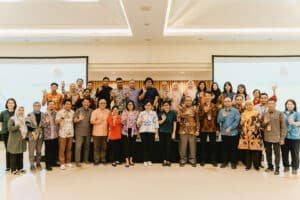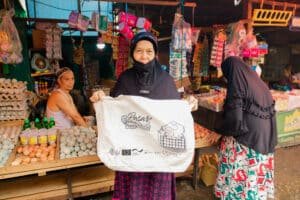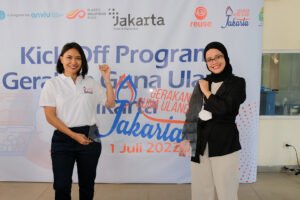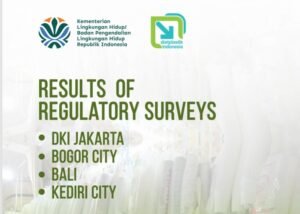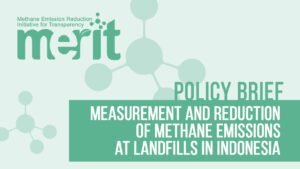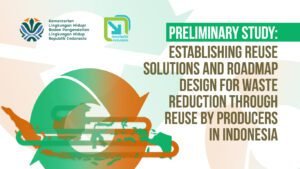Bangkok, August 23, 2024 — In a groundbreaking gathering of environmental advocates and leaders, the Asia Reuse Consortium convened in Bangkok to discuss and promote actionable solutions to combat plastic pollution through the adoption of reuse and refill practices. The event, which brought together key stakeholders from across the region, underscored the urgent need to move beyond single-use plastics and highlighted successful initiatives already making a significant impact.
Treesuvit Arriyavat, Program Manager of ASEAN Circular Economy Stakeholder Platform started his remarks with the importance of collaborative action and partnership in combating plastic marine debris, especially in plastic waste prevention efforts in regional level. “As an ASEAN Knowledge and Information Portal on Circular Economy, we have seen encouraging examples of good practices in Southeast Asia countries. However, the success of reuse and refill system depends on the involvement of all stakeholders ranging from the government, businesses, CSOs, and consumers,” Arriyavat stated.
One common interest that become a strong reason to highlight the reuse and refill practices is because of sachet waste problem experienced by most developing countries in Asia. Devayani Khare of Break Free From Plastic opened the event by emphasizing the pervasive environmental and health impacts of problematic and avoidable plastics, particularly sachets. “Sachets are a primary culprit of plastic pollution. They are not only environmentally damaging but also pose significant health risks. The current strategies to mitigate their impact have been largely ineffective. It’s time to phase out non-essential plastics, hold corporations accountable, and protect vulnerable communities,” said Khare.
To face the problems, countries in Asia are making efforts to prevent the waste by reuse movement. Luckily, several countries also have a strong foundation to carry it from community to the business level to strengthen the reuse movement. Rahyang Nusantara, Deputy Director of Plasticdiet Indonesia and Co-convener of the Asia Reuse Consortium, highlighted Asia’s leadership in reuse and refill solutions. “Asia is home to a burgeoning reuse and refill movement. We are demonstrating that these solutions are not only viable but also essential in reducing plastic waste. Through infrastructure development, regulatory arrangements, and multi-stakeholder collaboration, we can make reuse the norm and significantly decrease reliance on single-use plastics,” Nusantara stated.
The Asia Reuse Consortium, has been acknowledge not only in national level but also regional level, as the collaborative efforts to promote reuse and refill solutions to support the systemic change in achieving reuse as a new norm. “I would like to highlight the work of Asia Reuse Consortium, a groundbreaking initiative co-convened by Dietplastik Indonesia, Global Alliance for Incinerator Alternatives for Asia Pacific, and Break Free From Plastic. This consortium unites stakeholders from different sectors including government, startups, MSMEs, and CSOs across Indonesia, the Philippines, Viet Nam, as well as India to promote reuse and refill solutions. this consortium exemplifies the importance of collective action amongst stakeholders in implementing sustainable practice and by leveraging regional collaboration and share expertise,” said Arriyavat.
Running reuse initiatives is not only for environmental reasons, but also to support socioeconomic benefits. Marian Ledesma, Zero Waste Campaigner from Greenpeace Philippines, shared insights into the successful implementation of reuse systems in the Philippines, notably the Kuha sa Tingi initiative. “By introducing dispensers in community stores, we have significantly reduced the consumption of sachets, bringing both environmental and socioeconomic benefits. With over 1,000 stores participating, this model proves that reuse and refill systems can thrive with the right support from the government. Likewise, the business sector will also have a role to play in scaling reuse and refill,” Ledesma explained.
As a main reason to prevent single use plastics, reuse initiatives still needs a strong regulation to make as a new norm in the society. Salisa Traipipitsiriwat, Senior Campaigner at the Environmental Justice Foundation, presented Thailand’s efforts to reduce single-use bottles through the Bottle Free Seas initiative. “Our pilot water refill stations across Bangkok have prevented nearly 1 million bottles from entering the environment in just one year. However, challenges remain, including the need for legally binding targets and a supportive legal framework to prioritize reuse for single-use plastic reduction,” Traipipitsiriwat said.

Left to right: Marian Ledesma (Greenpeace Philippines), Darina Maulana (Enviu), Salisa Traipipitsiriwat (Environmental Justice Foundation), Devayane Khare (Break Free From Plastic)
Transforming not only for voluntary community action, but also for building new form of sustainable business, reuse solutions have a challenge to escalate the initiatives in terms of financial supports. Darina Maulana, Program Lead for Zero Waste Living Lab, addressed the financial challenges of scaling reuse solutions. “To scale reuse in Indonesia and beyond, we need diverse funding at the ecosystem, solutions, and infrastructure levels. Grants, patient capital, and loans are crucial for proving the business case for reuse and attracting risk-averse private capital,” Maulana noted. She emphasized the importance of building a new model that makes the existing single-use plastic model obsolete.
The Asia Reuse Consortium closed the event with a call for global cooperation and legally binding targets within the upcoming Global Plastic Treaty to ensure the prioritization of reuse and refill systems. By setting clear targets and supporting infrastructure development, the consortium aims to drive the necessary changes to combat plastic pollution effectively.
For more information on the Asia Reuse Consortium and its initiatives, please visit www.plasticdiet.id/reuse or contact reusegroup@plasticdiet.id.


